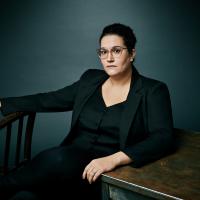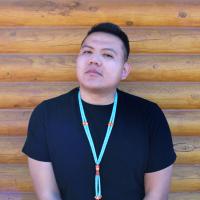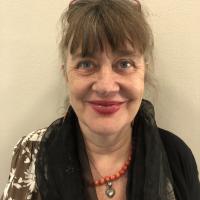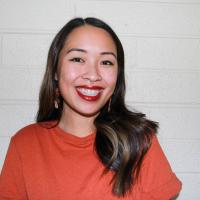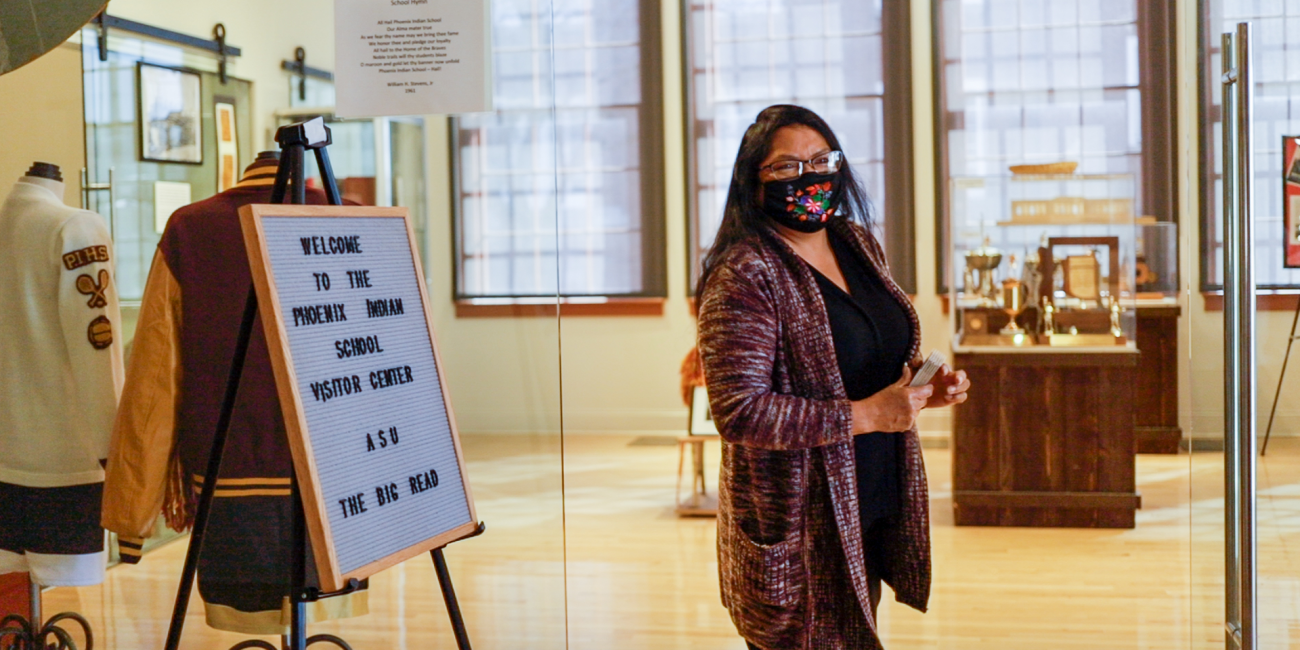
NEA Big Read: Phoenix
February - March, 2021
Celebrating Indigenous literary arts
In Spring of 2021, the Virginia G. Piper Center for Creative Writing at Arizona State University proudly received a Big Read Grant from the National Endowment for the Arts.
Inspired by The Round House by Anishinaabe author Louise Erdrich, the NEA Big Read: Phoenix featured over 25 talks, workshops, book clubs, performances, art exhibitions and other virtual events celebrating Indigenous literary arts and culture across the Valley during February and March 2021. We also gave away over 250 books for free.
To learn more about the NEA Big Read, keep reading. You can also find additional resources on The Round House at the ASU Library Guide or view our calendar to find upcoming events.
Learn more about the NEA Big Read
Videos
Events
Over 25 talks, workshops, book clubs, and more
Celebrating Indigenous literary arts and culture across the Valley, the NEA Big Read: Phoenix features over 25 talks, workshops, performances, art exhibitions, book clubs, and other virtual events inspired by The Round House by Louise Erdrich in February and March 2021, focusing on community archiving, family history, MMIWG, and more. Highlights and features include:
- Bring Them Home: An Evening Dedicated to Missing Indigenous Peoples with new work from keynote speaker Layli Long Soldier, whose debut collection WHEREAS was a finalist for the National Book Award on March 26.
- Evening Song: A Conversation on Diné Womenhood and Storytelling with Navajo Nation Poets Laureate Luci Tapahonso and Laura Tohe with ASU Professor Dr. Amanda R. Tachine (curated by award-winning poet Jake Skeets) on February 27.
- Special workshops with the Labriola National American Indian Center that use storytelling, community archiving, creative writing, and zines as a way to honor and preserve Indigenous family history starting February 13.
- Where We Stand: The Ethics and Impacts of Indigenous Land Recognitions with Dr. David Martinez, Dr. Felicia Mitchell, and ASU Librarian Alex Soto on March 17
- Only the Beginning: Arizona's Study Committee on Missing and Murdered Indigenous Women and Girls (MMIWG) with updates and reflections from Representative Jennifer Jermaine, April Ignacio, Debbie Nez Manuel, and Dr. Traci Morris on March 19
- Dispatches from the Field: Student Archivists and BIPOC Memory with the Labriola National American Indian Data Center and the Community Driven Archives Initiative at ASU Library on March 9
- Bił Náni’eeł: An Ekphrastic Writing Workshop on the Heard Museum with poet and Emerging Diné Writers Institute Director Manny Loely on March 13
To view past events, keep reading.
View events
Eyes Bottle Dark with a Mouthful of FlowersAugust 29, 2021, 2:00 p.m. |
Test Event 01Saturday, March 21, 2021, 6:30 p.m. to 8:00 p.m. |
An Evening with Carmen Maria MachadoSaturday, March 21, 2021, 6:30 p.m. to 8:00 p.m. |
Speakers
Over 40 speakers, partners, and community organizations
Our keynote speaker was poet Layli Long Soldier (Oglala Lakota), whose debut collection WHEREAS (Graywolf Press, 2017) was a finalist for the National Book Award. Our kick off featured Navajo Nation Poets Laureate Luci Tapahonso and Laura Tohe with Dr. Amanda R. Tachine and poet Jake Skeets.
Other authors, speakers, and partners included AGUILA Youth Leadership, Alex Soto, Amber McCrary, April Ignacio, the American Indian Policy Institute at ASU, ASU Library, the ASU Library Community Driven Archives Initiative, the ASU Library Labriola National American Indian Data Center, the ASU School of Art, Bojan Louis, Dr. David Martinez, Debbie Nez Manuel, the Emerging Diné Writers Institute, Emma Greguska, Dr. Felicia Mitchell, Gionni Ponce, Hayden’s Ferry Review, the Heard Museum, Hoot n Waddle, Indivisible Tohono, Representative Jennifer Jermaine, Jenny Irish, Joe Buenker, Dr. Kathleen A. Fox, Ken Duncan, Kyle Mitchell, Manny Loley, Mary Hood, OXDX, Palabras Bilingual Bookstore, Patti Hibbeler, Patty Talahongva, the Phoenix Indian Center, the Phoenix Indian School Visitors Center, the Research on Violent Victimization Lab at ASU, Rosalie Talahongva, Samuel Redbird, Sareya Taylor, the Storytelling Institute at South Mountain Community College, Dr. Traci Morris, Valaura Imus-Nahsonhoya, Violet Duncan, and XICO.
To meet past speakers, keep reading.
Meet speakers
Book
The Round House by Louise Erdrich
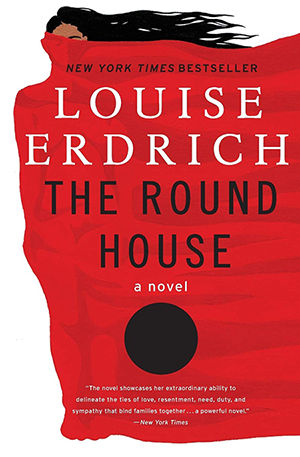
A page turning masterpiece of literary fiction
Blending the classic coming-of-age story with elements of memoir, detective novels, suspense, storytelling, and oral history, The Round House "tells the suspenseful tale of a 13-year-old boy's investigation and desire for revenge following a brutal attack on his mother that leaves his father, a tribal judge, helpless in his pursuit to bring the perpetrator to justice." (NEA Big Read).
While the primary theme in the novel is justice through the lens of indigenous history and tribal law, the book also explores family, sexuality, relationships, and religion.
To learn more about the book, keep reading.
A note about content
The Round House contains sensitive material and difficult subject matter that may be triggering for individuals who have been affected by violence against women, especially within Native communities. While we believe The Round House can guide us through these conversations—helping us to better understand the history and context of this violence, creating spaces of healing and connection for individuals, and moving us towards action and awareness as a larger community—it's important for us to center the experiences of those affected and acknowledge the risks.
If you or your loved ones have experienced or been affected by these issues, you can find services, support, and other community resources. We appreciate all of your bravery and heart in reading this book with us. We look forward to talking more with you soon.
About the author
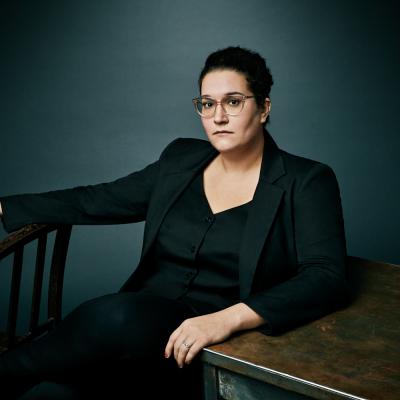
|
Carmen Maria MachadoCarmen Maria Machado is the author of the memoir In the Dream House and the short story collection Her Body and Other Parties. She has been a finalist for the National Book Award and the winner of the Bard Fiction Prize, the Lambda Literary Award for Lesbian Fiction, the Brooklyn Public Library Literature Prize, the Shirley Jackson Award, and the National Book Critics Circle's John Leonard Prize. In 2018, the New York Times listed Her Body and Other Parties as a member of "The New Vanguard," one of "15 remarkable books by women that are shaping the way we read and write fiction in the 21st century." |
More about the book
Riveting and supsensful, The Round House is a powerful coming-of-age story, a mystery, and a tender, moving novel of family, history, and culture.
One Sunday in the spring of 1988, a woman living on a reservation in North Dakota is attacked. The details of the crime are slow to surface because Geraldine Coutts is traumatized and reluctant to relive or reveal what happened, either to the police or to her husband, Bazil, and thirteen-year-old son, Joe. In one day, Joe's life is irrevocably transformed. He tries to heal his mother, but she will not leave her bed and slips into an abyss of solitude. Increasingly alone, Joe finds himself thrust prematurely into an adult world for which he is ill prepared.
While his father, who is a tribal judge, endeavors to wrest justice from a situation that defies his efforts, Joe becomes frustrated with the official investigation and sets out with his trusted friends, Cappy, Zack, and Angus, to get some answers of his own. Their quest takes them first to the Round House, a sacred space and place of worship for the Ojibwe. And this is only the beginning. (HarperCollins)
Resources
Local services and support
The Round House contains sensitive material and difficult subject matter that can be triggering for individuals who have experienced or been affected by violence against women, especially within Native communities.
While we believe The Round House can help guide us through these conversations and create action and awaress within the larger community, we want to proceed in these conversations with care, and connec individuals with local services, support, and other resources to find healing for themselves and their communities.
To find resources, keep reading. You can also find additional information and resources through the ASU Library Guide.
Indigenous and Tribal Resources for Sexual Assault and Domestic Violence
- The Southwest Indigenous Women's Coalition is a statewide tribal coalition that works to increase the safety, justice, and healing of any person that has been a victim of domestic and/or sexual violence.
- The National Indigenous Women's Resource Center is a Native-led nonprofit organization offering culturally grounded resources, technical assistance and training, and policy development to end violence against Native Women and children and strengthen tribal sovereignty.
- The Tribal Resource Tool is a searchable directory of services available for all American Indian and Alaska Native survivors of crime and abuse in Indian Country
Other Services for Sexual Assault and Domestic Abuse
- The Arizona Coalition to End Sexual and Domestic Violence provides education, training, technical assistance, policy recommendations, and other services and resources to victims and survivors of sexual and domestic violence.
- Amberly's Place (Yuma, AZ) brings together law enforcement officers, victim advocates, protective services, and other service providers to offer crisis intervention, medical attention, and other services to provide a safe and nurturing environment for survivors of domestic violence, sexual assualt, and human trafficking.
Legal Resources for Indigenous and Tribal Communities
- The Southwest Center for Law and Policy provides legal training, technical assistance, and other resources to tribal communities and organizations serving Native people.
- The Tribal Law and Policy Institute is a Native American operated non-profit providing free publications, comprehensive training, and technical assistance for Native nations and tribal justice systems
Shelter
- My Sister's Place (610 N Alma School Rd #18, Chandler, AZ 85224) provides a domestic violence shleter to women and children fleeing domestic violence, and is one of only two confidential shelters in the East Valley
- A New Leaf (868 E University Dr, Mesa, AZ 85203) provides a broad spectrum of support services—including homeless and domestic violence shelters, affordable housing solutions, youth services, foster care, counseling, financial literary, and more—to help individuals and families suceed.
- Sojourner Center (Phoenix, AZ) has been a safe haven from domestic violence by providing shelter and support services to over 60,000 adults and children since 1977.
- Emerge Center Against Domestic Abuse (2545 E Adams St, Tucson, AZ 85716) provides survivors with emergency shelter, safety planning, and education while engaging the entire community in addressing the underlying causes of abuse.
- Stepping Stone (West Yavapai County, AZ) provides 24/7 advocacy services—including safe shelter—to adults and chilrden affected by domestic violence, sexual assault, and other forms of victimization in West Yavapai County, AZ.
Hotlines
- The StrongHearts Native Helpline (1-844-7NATIVE) is a safe domestic, dating and sexual violence helpline for American Indians and Alaska Natives offering culturally-appropriate support and advocacy each day from 7:00 a.m. to 10:00 p.m. CST.
- The National Domestic Violence Hotline (1-800-799-SAFE) provides compassionate support, crisis intervention information, education, and referral services in over 200 languages to help survivors of domestic violence live their lives free of abuse (24 hours a day, seven days a week)
- The National Deaf Domestic Violence Hotline (1-855-812-1001) provides 24/7 support for Deaf callers nationwide
- The National Sexual Assault Hotline (1-800-656-HOPE) offered by RAINN (the Rape, Abuse & Incest National Network) is the nation's largest anti-sexual violence organization, working with more than 1,000 local sexual assault service providers across the country to prevent sexual violence, help survivors, and ensure that perpetrators are brought to justice.
- The National Human Trafficking Hotline (1-888-373-7888) connects victims and survivors of sex and labor trafficking with services and support to get help and stay safe, as well as receiving tips about potential situations and facilitating reports to the authorities (24 hours a day, seven days a week)
- The National Runaway Safeline (1-800-RUNAWAY) has been responding to youth and families in crisis for over 50 years, serving as the national communications system for runaway and homeless youth.
- The National Suicide Prevention Lifeline (1-800-273-TALK) is a national network of local crisis center than provides free and confidential support for people in distress, prevention and crisis resources for you or your loved ones, and best practices for professionals (24 hours a day, seven days a week)
T-Shirt
"Storytellers" from Jared Yazzie and OXDX
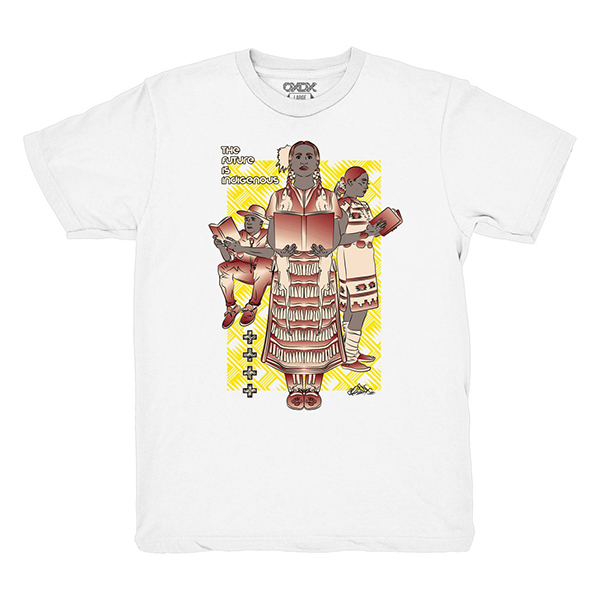
As part of our efforts to celebrate Indigenous creators across the Valley, we've teamed up with Jared Yazzie and OXDX to produce a special, limited-edition T-shirt commemorating the NEA Big Read: Phoenix!
T-shirts are available in black and white across a variety of sizes and are $20 each.
To learn more about the design and purchase the t-shirt, visit OXDX's website at https://www.oxdxclothing.com/.
About OXDX

|
Carmen Maria MachadoCarmen Maria Machado is the author of the memoir In the Dream House and the short story collection Her Body and Other Parties. She has been a finalist for the National Book Award and the winner of the Bard Fiction Prize, the Lambda Literary Award for Lesbian Fiction, the Brooklyn Public Library Literature Prize, the Shirley Jackson Award, and the National Book Critics Circle's John Leonard Prize. In 2018, the New York Times listed Her Body and Other Parties as a member of "The New Vanguard," one of "15 remarkable books by women that are shaping the way we read and write fiction in the 21st century." |
Donate
Support Indigenous communities
The Phoenix Indian Center is the oldest American Indian non-profit organization of its kind in the United States, providing workforce development, cultural enrichment, and other vital services to Indigenous communities throughout the Valley for over 70 years.
To support their work, visit their website at https://phxindcenter.org/financial-support/, click the donate button, enter an amount, and enter "NEA Big Read" in the description.
Please consider making a gift to the Phoenix Indian Center today.
About the Phoenix Indian Center

|
Carmen Maria MachadoCarmen Maria Machado is the author of the memoir In the Dream House and the short story collection Her Body and Other Parties. She has been a finalist for the National Book Award and the winner of the Bard Fiction Prize, the Lambda Literary Award for Lesbian Fiction, the Brooklyn Public Library Literature Prize, the Shirley Jackson Award, and the National Book Critics Circle's John Leonard Prize. In 2018, the New York Times listed Her Body and Other Parties as a member of "The New Vanguard," one of "15 remarkable books by women that are shaping the way we read and write fiction in the 21st century." |
About
A program of the National Endowment for the Arts
NEA Big Read is a program of the National Endowment for the Arts (NEA) designed to broaden our understanding of our world, our communities, and ourselves through the joy of sharing a good book. The Virginia G. Piper Center for Creative Writing is one of 84 not-for-profit organizations to receive a grant to host an NEA Big Read project between September 2020 and June 2021. The NEA presents NEA Big Read in partnership with Arts Midwest.
NEA Big Read offers a range of titles that reflect many different voices and perspectives, aiming to inspire conversation and discovery. The main feature of the initiative is a grants program, managed by Arts Midwest, which annually supports dynamic community reading programs, each designed around a single National Endowment for the Arts Big Read selection.
Since 2006, the National Endowment for the Arts has funded more than 1,600 NEA Big Read programs, providing more than $22 million to organizations nationwide. Over the past thirteen years, grantees have leveraged more than $50 million in local funding to support their NEA Big Read programs. More than 5.7 million Americans have attended an NEA Big Read event, approximately 91,000 volunteers have participated at the local level, and 39,000 community organizations have partnered to make NEA Big Read activities possible.
The NEA Big Read: Phoenix is presented by the Virginia G. Piper Center for Creative Writing at Arizona State University with additional support from Arizona Humanities, Phoenix Public Library, the College of Liberal Arts and Sciences Humanities Division at ASU, and over 40 authors, speakers, and community partners.
About the National Endowment for the Arts
Established by Congress in 1965, the National Endowment for the Arts is the independent federal agency whose funding and support gives Americans the opportunity to participate in the arts, exercise their imaginations, and develop their creative capacities. Through partnerships with state arts agencies, local leaders, other federal agencies, and the philanthropic sector, the Arts Endowment supports arts learning, affirms and celebrates America’s rich and diverse cultural heritage, and extends its work to promote equal access to the arts in every community across America. Visit arts.gov to learn more.
About Arts Midwest
Arts Midwest promotes creativity, nurtures cultural leadership, and engages people in meaningful arts experiences, bringing vitality to Midwest communities and enriching people’s lives. Based in Minneapolis, Arts Midwest connects the arts to audiences throughout the nine-state region of Illinois, Indiana, Iowa, Michigan, Minnesota, North Dakota, Ohio, South Dakota, and Wisconsin. One of six non-profit regional arts organizations in the United States, Arts Midwest’s history spans more than 35 years. For more information, please visit artsmidwest.org.

